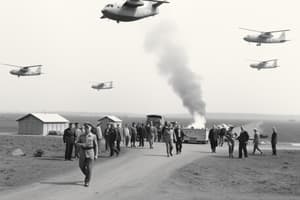Podcast
Questions and Answers
Which of the following events is most directly associated with the term 'D-Day'?
Which of the following events is most directly associated with the term 'D-Day'?
- The Allied invasion of Normandy (correct)
- The signing of the Nazi-Soviet Non-Aggression Pact
- The bombing of Pearl Harbor
- The Battle of Britain
The policy of appeasement, adopted by some European powers before World War II, involved taking aggressive military action against expansionist regimes.
The policy of appeasement, adopted by some European powers before World War II, involved taking aggressive military action against expansionist regimes.
False (B)
What was the name of the project undertaken by the US during World War II that eventually developed the atomic bomb?
What was the name of the project undertaken by the US during World War II that eventually developed the atomic bomb?
Manhattan Project
The Treaty_of Versailles had a significant ______ on WWII.
The Treaty_of Versailles had a significant ______ on WWII.
Match the following World War II leaders with their respective countries:
Match the following World War II leaders with their respective countries:
Which of the following was a key concept related to the Holocaust during World War II?
Which of the following was a key concept related to the Holocaust during World War II?
The Nuremberg Trials were primarily held to prosecute individuals responsible for hyperinflation in post-war Germany.
The Nuremberg Trials were primarily held to prosecute individuals responsible for hyperinflation in post-war Germany.
What term describes the German military tactic of rapid and overwhelming force, characterized by the use of tanks, air power, and coordinated troop movements?
What term describes the German military tactic of rapid and overwhelming force, characterized by the use of tanks, air power, and coordinated troop movements?
The Great Depression had a significant ______ on WWII.
The Great Depression had a significant ______ on WWII.
Which of these locations was least involved in the conferences held toward the end of or immediately following World War II?
Which of these locations was least involved in the conferences held toward the end of or immediately following World War II?
Flashcards
What is genocide?
What is genocide?
The deliberate killing of a large number of people from a particular nation or ethnic group with the aim of destroying that nation or group.
What is hyperinflation?
What is hyperinflation?
A period of extreme monetary inflation that destabilizes the economy.
What is anti-semitism?
What is anti-semitism?
Hostility to or prejudice against Jews.
What was The Holocaust?
What was The Holocaust?
Signup and view all the flashcards
What is appeasement?
What is appeasement?
Signup and view all the flashcards
What is Blitzkrieg?
What is Blitzkrieg?
Signup and view all the flashcards
What are Nuremberg Laws?
What are Nuremberg Laws?
Signup and view all the flashcards
What was the Final Solution?
What was the Final Solution?
Signup and view all the flashcards
What was D-Day?
What was D-Day?
Signup and view all the flashcards
What was Island Hopping?
What was Island Hopping?
Signup and view all the flashcards
Study Notes
- WWII study notes
Vocabulary
- Genocide: The deliberate killing of a large group of people, especially those of a particular ethnic group or nation
- Hyperinflation: Monetary inflation occurring at a very high rate
- Anti-Semitism: Hostility to or prejudice against Jews
- The Holocaust: The mass murder of Jews under the German Nazi regime from 1941 to 1945
- Appeasement: The action or process of appeasing
- Non-aggression Pact: A treaty between two or more states/countries that includes a promise by each to not engage in military action against each other
- Blitzkrieg: An intense military campaign intended to bring about a swift victory
- Nuremberg Laws: antisemitic laws in Nazi Germany
- Final Solution: A Nazi plan for the extermination of the Jews during World War II
- D-Day: The day in World War II on which Allied forces invaded northern France by means of beach landings
- Island Hopping: A military strategy employed by the Allies in the Pacific War against Japan and the Axis powers during World War II
- United Nations: An international organization formed in 1945 to increase political and economic cooperation among its member countries
- Nuremberg Trials: A series of military tribunals held after World War II by the Allied forces
Important Figures
- Adolf Hitler
- Benito Mussolini
- Hideki Tojo
- Emperor Hirohito
- Franklin Roosevelt
- Harry Truman
- Neville Chamberlain
- Winston Churchill
- Joseph Stalin
Key Concepts
- Effect of Great Depression on WWII
- Impact of Treaty of Versailles on WWII
- Italian, German and Japanese aggression to start WWII
- Failures of the League of Nations
- Impact of WWII on colonial empires
- Nazi-Soviet Non-Aggression Pact
- Battle of Britain
- French Resistance
- Nuremberg Laws and Trials
- Final Solution
- Destroyers for Bases and Lend Lease Act (US & UK)
- Atlantic Charter & United Nations
- Attack on Pearl Harbor
- North Africa Campaign
- D-Day
- Island Hopping Campaign
- Conferences: Yalta/Tehran/Potsdam
- Manhattan Project & use of the Atomic Bomb
Studying That Suits You
Use AI to generate personalized quizzes and flashcards to suit your learning preferences.




